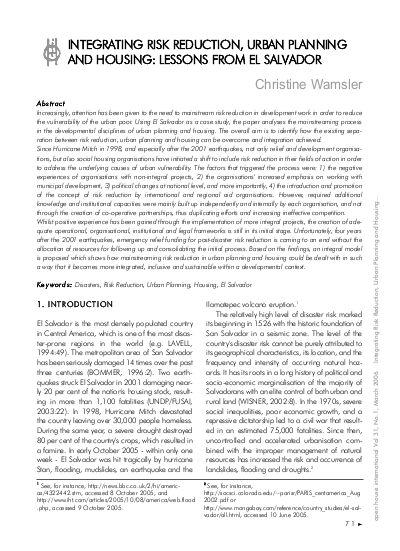
Increasingly, attention has been given to the need to mainstream risk reduction in development work in order to reduce the vulnerability of the urban poor. Using El Salvador as a case study, the paper analyses the mainstreaming process in the developmental disciplines of urban planning and housing. The overall aim is to identify how the existing separation between risk reduction, urban planning and housing can be overcome and integration achieved. Since Hurricane Mitch in 1998, and especially after the 2001 earthquakes, not only relief and development organisations, but also social housing organisations have initiated a shift to include risk reduction in their fields of action in order to address the underlying causes of urban vulnerability. The factors that triggered the process were: 1) the negative experiences of organisations with non-integral projects, 2) the organisations' increased emphasis on working with municipal development, 3) political changes at national level, and more importantly, 4) the introduction and promotion of the concept of risk reduction by international and regional aid organisations. However, required additional knowledge and institutional capacities were mainly built up independently and internally by each organisation, and not through the creation of co-operative partnerships, thus duplicating efforts and increasing ineffective competition. Whilst positive experience has been gained through the implementation of more integral projects, the creation of adequate operational, organisational, institutional and legal frameworks is still in its initial stage. Unfortunately, four years after the 2001 earthquakes, emergency relief funding for post-disaster risk reduction is coming to an end without the allocation of resources for following up and consolidating the initial process. Based on the findings, an integral model is proposed which shows how mainstreaming risk reduction in urban planning and housing could be dealt with in such a way that it becomes more integrated, inclusive and sustainable within a developmental context.
Resource collections
- Topics
- UN Habitat - Urban Response Collection
- Urban Response - Urban Crisis Preparedness and Risk Reduction
- Urban Response Collection - Community Engagement and Social Cohesion
- Urban Response Collection - Economic Recovery
- Urban Response Collection - Environment and Climate Change
- Urban Response Collection - Housing, Land and Property
- Urban Response Collection - Urban Crisis Response, Recovery and Reconstruction
- Urban Response Collection - Urban Resilience
